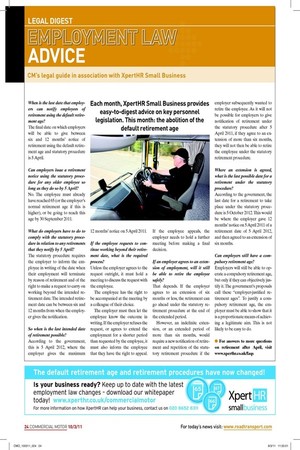ADVICE
Page 21

If you've noticed an error in this article please click here to report it so we can fix it.
CM’s legal guide in association with XpertHR Small Business Each month, XpertHR Small Business provides easy-to-digest advice on key personnel legislation. This month: the abolition of the default retirement age
When is the last date that employers can notify employees of retirement using the default retirement age?
The inal date on which employers will be able to give between six and 12 months’ notice of retirement using the default retirement age and statutory procedure is 5 April.
Can employers issue a retirement notice using the statutory procedure for any older employee so long as they do so by 5 April?
No. The employee must already have reached 65 (or the employer’s normal retirement age if this is higher), or be going to reach this age by 30 September 2011.
What do employers have to do to comply with the statutory procedure in relation to any retirements that they notify by 5 April?
The statutory procedure requires the employer to inform the employee in writing of the date when their employment will terminate by reason of retirement and of the right to make a request to carry on working beyond the intended retirement date. The intended retirement date can be between six and 12 months from when the employer gives the notiication.
So when is the last intended date of retirement possible?
According to the government, this is 5 April 2012, where the employer gives the maximum If the employee requests to continue working beyond their retirement date, what is the required process?
Unless the employer agrees to the request outright, it must hold a meeting to discuss the request with the employee.
The employee has the right to be accompanied at the meeting by a colleague of their choice.
The employer must then let the employee know the outcome in writing. If the employer refuses the request, or agrees to extend the employment for a shorter period than requested by the employee, it must also inform the employee that they have the right to appeal. If the employee appeals, the employer needs to hold a further meeting before making a inal decision.
If an employer agrees to an extension of employment, will it still be able to retire the employee safely?
That depends. If the employer agrees to an extension of six months or less, the retirement can go ahead under the statutory retirement procedure at the end of the extended period.
However, an indeinite extension, or an extended period of more than six months, would require a new notiication of retirement and repetition of the statutory retirement procedure if the employer subsequently wanted to retire the employee. As it will not be possible for employers to give notiication of retirement under the statutory procedure after 5 April 2011, if they agree to an extension of more than six months, they will not then be able to retire the employee under the statutory retirement procedure.
Where an extension is agreed, what is the last possible date for a retirement under the statutory procedure?
According to the government, the last date for a retirement to take place under the statutory procedure is 5 October 2012. This would be where the employer gave 12 months’ notice on 5 April 2011 of a retirement date of 5 April 2012, and then agreed to an extension of six months.
Can employers still have a compulsory retirement age?
Employers will still be able to operate a compulsory retirement age, but only if they can objectively justify it. The government’s proposals call these “employer-justiied retirement ages”. To justify a compulsory retirement age, the employer must be able to show that it is a proportionate means of achieving a legitimate aim. This is not likely to be easy to do.
● For answers to more questions on retirement after April, visit www.xperthr.co.uk/faqs














































